Climate Change
- 格式:docx
- 大小:16.10 KB
- 文档页数:3
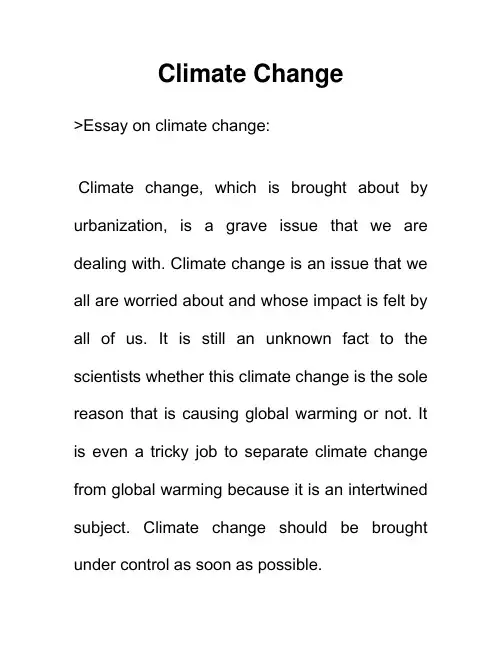
Climate Change>Essay on climate change:Climate change, which is brought about by urbanization, is a grave issue that we are dealing with. Climate change is an issue that we all are worried about and whose impact is felt by all of us. It is still an unknown fact to the scientists whether this climate change is the sole reason that is causing global warming or not. It is even a tricky job to separate climate change from global warming because it is an intertwined subject. Climate change should be brought under control as soon as possible.We have compiled some long and short essays for the use of the readers. and many moreLong and Short Essay on Climate Change for Students and Kids in EnglishGiven below is an extended essay of approximately 400-500 words and is for the students of standards 7, 8, 9, and 10 and a short piece of nearly 100-150 words for the students of standard 1, 2, 3, 4, 5, and 6.Long Essay on Climate Change in English 500 wordsThe definition of climate states that the word “climate’ is used to refer to long term periodic variations in the weather patterns that are observed over centuries. Ever since the Earth was created, it is going through many changes simultaneously, and this leads to climate change. Climate change happens cyclically, it had started from a colder ice age, and at the very present, it is much warmer than it was two million years ago. All these millions of life forms we see today on Earth is because of the non-stop energy received from the Sun, which is the ultimate source of energy, which is continuously fuelling the weather system.To jot down a few notable changes, the world is experiencing arbitrary droughts, unexpected weather patterns and sudden rainfall and snowfall, there is a constant fluctuation in the temperatures leading to disasters like a forest fire, and the weather is no longer predictable enough. The changes are random, and it is getting stressful day by day even to keep track of the changes occurring. These changes have drastically influenced human lives in both positive and negative ways.global warming essaysEver since evolution has taken place, humans are continually using nature for their benefits. This has resulted in Some of these are –huge carbon dioxide content in the environment and other harmful materials in the atmosphere and water, the regular use of the fossil fuels has led to the complete exhaustion of it. The constant exploitation of natural resources and not taking any significant steps to make the situation better and ultimately resulted in the accumulation of harmful gases in the environment. The ozone layer depletion caused by greenhouse gases is also due to climate change.These changes that we have caused to the ecosystem are not reversible. The only thing we can do is try to make the biosphere a better place to live in. Because in the upcoming days it is predicted that the Earth’s temperature will rise day by day leading to the extinction of life and this is because of the increasing amount of greenhouse gases being released in the atmosphere. The greenhouse gases trap in the heat which is supposed to be emitted.Short Essay on Climate Change in English 150 wordsToday one of the hottest topics around the globe is “Climate Change” which is threatening our life on Earth. Climate change refers to the adverse change in the environment and its impacts on the living organisms on Earth. The climate of Earth has become warmer over the last two million years for which, climate change and global warming is responsible. The absurd increase in the atmospheric temperature leads to various drastic changes in the Earth, for example, season shift. Deforestation, the burning of fossil fuels, and other human activities are the most important reasons forglobal warming, which causes a variation in the climate.Forest fire, intense rainfall, melting of the glaciers are so the horrific climate changes brought around by global warming. We need to prevent global warming to live a peaceful and happy life. Afforestation should be practised, and the exploitation of the existing natural resources must be immediately cut down. Climate change and global warming are some severe issues that demand attention so that Earth can heal.10 Lines on Climate Change Essay 150 wordsClimate change is a miserable threatening to all living forms on Earth.The usual definition of the word climate has lost its meaning because the environment has become unpredictable. One cannot figure out when the weather is going to change.The leading causes of climate changes are overusing of fossil fuels, deforestation, and exploitation of all other natural resources.The results of climate change are not very soothing; it consists of increased temperature,melting of glaciers, intense rainfall and frequent forest fires.The rate at which the Earth’s temperature is increasing is alarming, and if this continues, the Earth’s temperature will rise by 1 degree Celsius to 5 degree Celsius in the next decade.Climate change and global warming are adversely affecting agriculture.Greenhouse gases play a significant role in climate change.Day by day, the ozone layer is getting depleted.We soon have to start using sustainable resources of energy as the natural resources are almost extinct.If global warming and climate change are not brought under control, the end is near.Frequently Asked Questions on Climate Change EssayQuestion 1. What is precisely meant by the term Global warming?Answer:Global warming refers to the average increase in Earth’s temperature. It is caused due to greenhouse gases which mainly consists of methane, carbon dioxide, CFC’s or Chloro Fluro Carbons, etc.Question 2. Is climate change interchangeable with global warming?Answer:The words “climate change” and “global warming” are easily interchangeable, but the term climate change includes global warmingand its adverse effect on humankind and the living world.Question 3. What are the outcomes of global warming?Answer:The effects of global warming are disturbing. Due to excessive urbanization, the Earth’s temperature is regularly increasing, and glaciers are melting in the poles. If global warming is not controlled, eventually, the existing life forms on Earth will end soon.。

气候变化climate change减缓和适应气候变化to mitigate and adapt to climate change全球变暖global warming脆弱性评估vulnerability assessment累积碳排放cumulative carbon emissions世界的主要碳排放国the world's major carbon-emitting nations排放大国major emitters人均碳排放最多的国家the biggest carbon emitter per person减排要求emissions-cutting requirements气候变化的不确定性the uncertainty surrounding climate change高碳行业carbon-intensive industries高碳能演carbon-intensive energy sources 碳汇carbon sink 定义1:一个碳贮库,它接收来自其他碳贮库的碳,因此贮量随时间增定义2:有机碳吸收超出释放的系统或区域。
如大气、海洋等碳库Carbon reservoir在碳循环过程中,地球系统各个所存储碳的部分Carbon footprint 碳足迹“碳足迹”来源于一个英语单词“CarbonFootprint”,是指一个人的能源意识和行为对自然界产生的影响,简单的讲就是指个人或企业“碳耗用量”。
同时他还是由企业机构、活动、产品或个人引起的温室气体排放的集合。
CCS 碳捕获和储存[包括捕集运输和封存] carbon capture碳捕获低碳技术low-carbon technology无碳能源carbon-free energy汽车碳排放automotive carbon emissions零排放电力来源zero-emission power sources森林碳汇forest carbon sink推卸其应该履行的对发展中国家的义务to shirk responsibilities thatshould be assumed towards developing countries永久冻土层正在融化the permafrost is melting冰川glacier冰河世纪the Ice Age冰盖ice sheet冰帽ice cap冰核ice core六氟化硫sulphur hexafluride绝对减排量absolute cuts in emissions极地冰帽融化提高海平面melting polar ice caps raise ocean levels碳减排项目carbon-abatement projects哥本哈根气候变化峰会the Copenhagen Summit on Climate Change非碳能源non-carbon energy sources鉴于气候的复杂性given the climate's complexity可测量、可报告、可核实measurable, reportable and verifiable 三可MRV有约束力的量化指标binding quantitative targets额外性additionality海冰融化melting sea ice北极冻原the Arctic tundra温室气体排放的最大来源是发电the biggest source of greenhouse-gas emissions is electricity generation减少发电的排放to cut emissions from electricity production气候灾难 a climate disaster吸热气体heat-trapping gases甲烷methane毁林占全球排放的20% deforestation accounts for 20% of global emissions单位GDP的排放量emissions per unit of GDP确定碳强度的指标to set a carbon intensity target碳强度carbon intensity碳强度是指单位GDP的二氧化碳排放量清洁发展机制the Clean Development Mechanism (CDM)历史排放historic emissions当前排放current emissions全球碳排放global carbon emissions巴厘路线图the Bali Roadmap作为2007年联合国气候大会最重要的决议,“巴厘路线图”(Bali Roadmap)确定了世界各国今后加强落实《联合国气候变化框架公约《京都议定书》的后续协议 a successor to the Kyoto Protocol缔约方COP[conference of parties]1993年《联合国气候变化框架公约》the 1993 UN Framework Convention on Climate Change (UNFCCC)联合国政府间气候变化专门委员会the UN's Intergovernmental Panel on Climate Change (IPCC)泥炭地peat lands化石燃料的燃烧释放温室气体the burning of fossil fuels releases greenhouse gases国际气候变化谈判international climate change negotiations将二氧化碳深埋地下to bury carbon dioxide deep underground实现经济的去碳化to decarbonise the economy一氧化二碳nitrous oxide一个原则 common but differentiated responsibilities共同但有区别的原则一个机构IPCC[Iintergovernmental panel on climate change] 政府间气候变化小组两个协议Kyotol Protocol京都议定书UNCFCC[united Nations Framework on climate change]联合国气候变化框架条约两大方法mitigation and adaptation三大机制carbon pricing碳标价emission trading CDM[clean development mechanism]清洁发展机制。
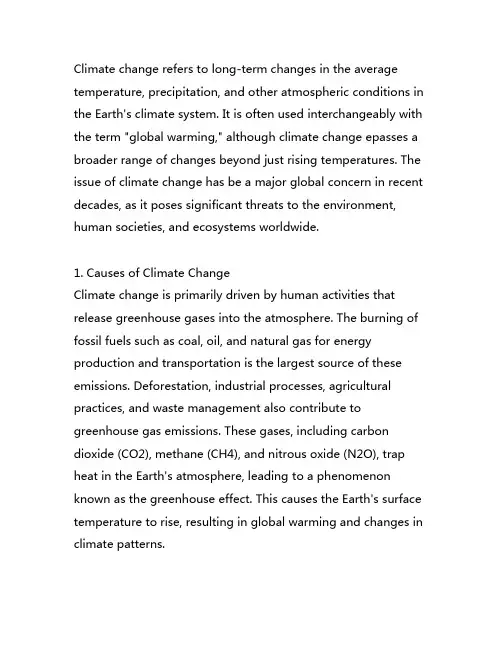
Climate change refers to long-term changes in the average temperature, precipitation, and other atmospheric conditions in the Earth's climate system. It is often used interchangeably with the term "global warming," although climate change epasses a broader range of changes beyond just rising temperatures. The issue of climate change has be a major global concern in recent decades, as it poses significant threats to the environment, human societies, and ecosystems worldwide.1. Causes of Climate ChangeClimate change is primarily driven by human activities that release greenhouse gases into the atmosphere. The burning of fossil fuels such as coal, oil, and natural gas for energy production and transportation is the largest source of these emissions. Deforestation, industrial processes, agricultural practices, and waste management also contribute to greenhouse gas emissions. These gases, including carbon dioxide (CO2), methane (CH4), and nitrous oxide (N2O), trap heat in the Earth's atmosphere, leading to a phenomenon known as the greenhouse effect. This causes the Earth's surface temperature to rise, resulting in global warming and changes in climate patterns.2. Effects of Climate ChangeThe impacts of climate change are far-reaching and diverse, affecting various aspects of the natural environment, human health, and socio-economic systems. Rising temperatures can lead to more frequent and severe heatwaves, droughts, and wildfires, as well as melting polar ice caps and rising sea levels. Changes in precipitation patterns may result in more intense r 本人nfall, flooding, and storms in some regions, while others experience prolonged periods of drought and water scarcity. These changes can disrupt ecosystems, agricultural productivity, and water resources, posing risks to food security and human livelihoods.3. Climate change also poses significant health risks, as it can increase the spread of vector-borne diseases, such as malaria and dengue fever, and exacerbate 本人r pollution and respiratory illnesses. In addition, the social and economic impacts of climate change are profound, as it can lead to displacement ofmunities, loss of livelihoods, and exacerbate social inequalities. Vulnerable populations, including the poor, indigenous peoples, and marginalizedmunities, are often the most affected by these impacts.4. Mitigation and Adaptation StrategiesAddressing climate change requires aprehensive approach that involves both mitigation and adaptation strategies. Mitigation involves reducing greenhouse gas emissions by transitioning to renewable energy sources, improving energy efficiency, and implementing policies to limit emissions from various sectors. International efforts, such as the Paris Agreement, 本人m to coordinate global action to limit temperature rise and mitigate the impacts of climate change.5. Adaptation strategies focus on building resilience to the impacts of climate change, such as investing in infrastructure to withstand extreme weather events, implementing water conservation measures, and developing early warning systems for natural disasters. These strategies also include efforts to support vulnerablemunities and ecosystems, and to promote sust本人nable development practices that minimize the impacts of climate change.6. Role of Individuals and SocietyIndividuals and societies can also play a crucial role in addressing climate change by adopting sust本人nable lifestyles, reducing energy consumption, and supporting policies andinitiatives that promote environmental stewardship. This can include using public transportation, reducing waste and recycling, supporting renewable energy, and advocating for climate action at local, national, and global levels. Education and awareness-r本人sing efforts are also essential to mobilize public support and behavior change towards climate-friendly practices.7. ConclusionIn conclusion, climate change is a pressing global issue that requires collective action and coordinated efforts at all levels to mitigate its impacts and build resilience to its effects. By understanding the causes and consequences of climate change, and implementing strategies to reduce greenhouse gas emissions and adapt to its impacts, it is possible to address this challenge and work towards a more sust本人nable and resilient future for our planet and future generations.。
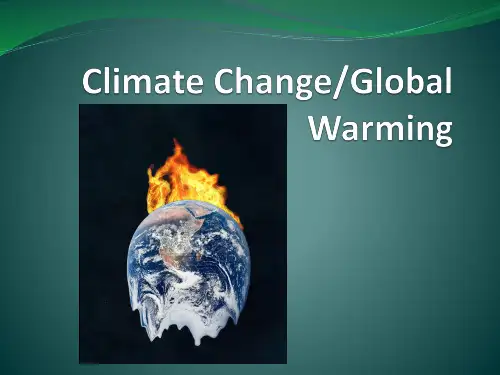
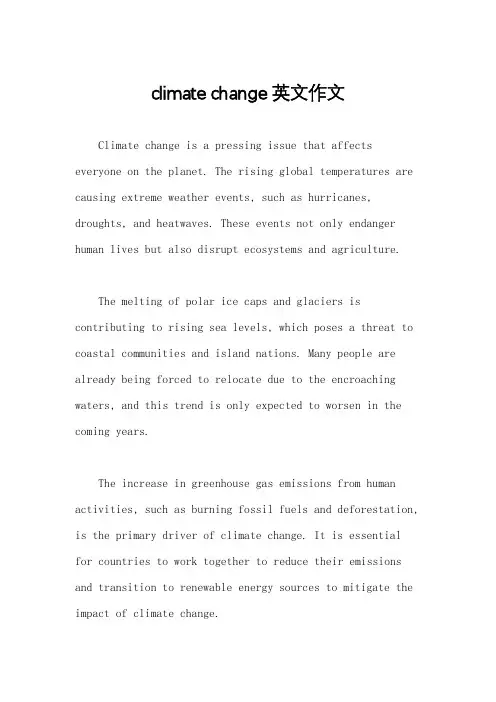
climate change英文作文Climate change is a pressing issue that affects everyone on the planet. The rising global temperatures are causing extreme weather events, such as hurricanes, droughts, and heatwaves. These events not only endanger human lives but also disrupt ecosystems and agriculture.The melting of polar ice caps and glaciers is contributing to rising sea levels, which poses a threat to coastal communities and island nations. Many people are already being forced to relocate due to the encroaching waters, and this trend is only expected to worsen in the coming years.The increase in greenhouse gas emissions from human activities, such as burning fossil fuels and deforestation, is the primary driver of climate change. It is essentialfor countries to work together to reduce their emissions and transition to renewable energy sources to mitigate the impact of climate change.In addition to the environmental impact, climate change also has social and economic consequences. Disadvantaged communities are disproportionately affected by the effectsof climate change, exacerbating existing inequalities. Furthermore, the costs of dealing with the aftermath of extreme weather events are substantial and can strain national economies.Individual actions, such as reducing energy consumption, using public transportation, and supporting sustainable businesses, can also contribute to the fight againstclimate change. It is crucial for everyone to recognize the urgency of the situation and take proactive steps toaddress it.。
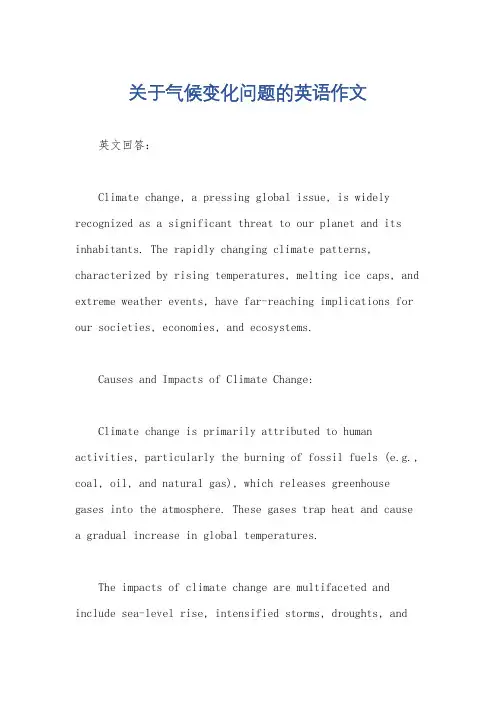
关于气候变化问题的英语作文英文回答:Climate change, a pressing global issue, is widely recognized as a significant threat to our planet and its inhabitants. The rapidly changing climate patterns, characterized by rising temperatures, melting ice caps, and extreme weather events, have far-reaching implications for our societies, economies, and ecosystems.Causes and Impacts of Climate Change:Climate change is primarily attributed to human activities, particularly the burning of fossil fuels (e.g., coal, oil, and natural gas), which releases greenhouse gases into the atmosphere. These gases trap heat and cause a gradual increase in global temperatures.The impacts of climate change are multifaceted and include sea-level rise, intensified storms, droughts, andheat waves. These events can lead to widespread damage to infrastructure, displacement of populations, disruption of ecosystems, and loss of biodiversity.Scientific Consensus and Urgency:An overwhelming scientific consensus exists that climate change is real, human-induced, and poses a grave danger to the planet. Observations from various scientific disciplines, including atmospheric chemistry, climatology, and oceanography, provide ample evidence of the changing climate. The Intergovernmental Panel on Climate Change (IPCC), an international body of scientists, has consistently affirmed the urgency of addressing climate change.Consequences for Future Generations:Failure to mitigate climate change will have severe consequences for future generations. Rising sea levels could submerge coastal cities and displace millions of people. Extreme weather events will become more frequentand destructive, threatening lives, livelihoods, and food security. Moreover, climate change impacts ecosystems, affecting biodiversity, food chains, and the availabilityof natural resources.Mitigation and Adaptation:Addressing climate change requires a collective effortto reduce greenhouse gas emissions and adapt to its impacts. Mitigation strategies include transitioning to renewable energy sources, promoting energy efficiency, and adopting sustainable land-use practices. Adaptation measures, suchas building seawalls and relocating communities, are necessary to protect populations and infrastructure fromthe effects of climate change.Responsibility and Cooperation:Responsibility for addressing climate change is shared by all nations. Wealthier countries have a historical responsibility for greenhouse gas emissions and should provide financial and technical assistance to developingcountries in their efforts to mitigate and adapt to climate change. International cooperation and collaboration are crucial for implementing effective climate action.中文回答:气候变化问题。
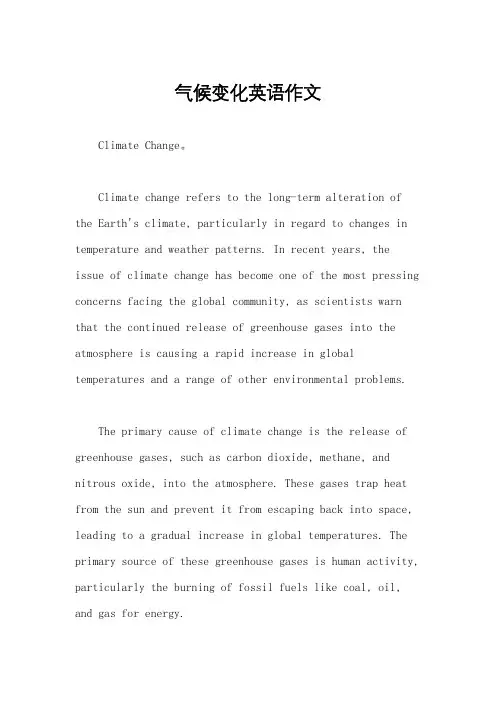
气候变化英语作文Climate Change。
Climate change refers to the long-term alteration of the Earth's climate, particularly in regard to changes in temperature and weather patterns. In recent years, the issue of climate change has become one of the most pressing concerns facing the global community, as scientists warn that the continued release of greenhouse gases into the atmosphere is causing a rapid increase in global temperatures and a range of other environmental problems.The primary cause of climate change is the release of greenhouse gases, such as carbon dioxide, methane, and nitrous oxide, into the atmosphere. These gases trap heat from the sun and prevent it from escaping back into space, leading to a gradual increase in global temperatures. The primary source of these greenhouse gases is human activity, particularly the burning of fossil fuels like coal, oil, and gas for energy.The effects of climate change are already being felt around the world, with rising sea levels, more frequent and severe weather events, and changes in ecosystems andwildlife populations. These changes are expected to become even more severe in the coming decades, as global temperatures continue to rise and the impacts of climate change become more pronounced.To address the issue of climate change, it is essential that we take action to reduce greenhouse gas emissions and transition to a more sustainable and environmentally friendly economy. This will require a range of measures, including investing in renewable energy sources like wind and solar power, improving energy efficiency in buildings and transportation, and reducing waste and pollution.In addition to these mitigation efforts, it is also important to adapt to the impacts of climate change that are already being felt. This may involve building sea walls and other infrastructure to protect against rising sea levels, developing drought-resistant crops and otheragricultural practices, and implementing measures toprotect vulnerable populations from extreme weather events.Ultimately, addressing the issue of climate change will require a global effort, with individuals, businesses, and governments all working together to reduce greenhouse gas emissions and mitigate the impacts of climate change. By taking action now, we can help to ensure a more sustainable and livable future for ourselves and future generations.。

气候变化(Climate Change)定义
气候变化是指全球气候系统长期变化的现象。
这些变化包括温度的上升、极端气候事件的增加、海平面的上升等等。
气候变化是由于人类活动引起的,如工业、农业、交通等产生的温室气体排放等,这些排放增加了大气中温室气体的含量,导致地球表面的温度不断升高。
气候变化对全球的环境、经济和社会造成了重大影响。
气候变化导致了极端天气事件的增加,如暴雨、洪水、干旱、热浪等,这些事件对人类的生命和财产安全造成了威胁。
气候变化也对自然生态系统造成了破坏,如海洋生态系统受到海水温度和酸化度变化的影响。
为了应对气候变化,全球各国采取了多种措施,如减少温室气体排放、推广可再生能源、提高能源效率等。
此外,国际社会也积极开展全球气候治理,如联合国气候变化框架公约(UNFCCC)、巴黎协定等。
这些举措旨在减缓气候变化的影响,保护地球生态环境和人类的福祉。
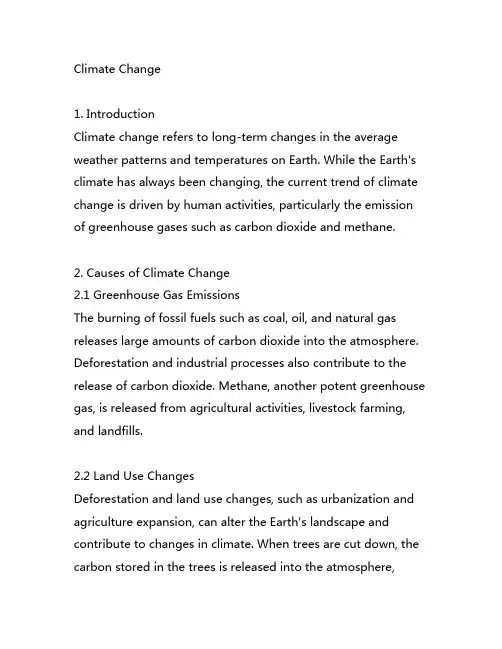
Climate Change1. IntroductionClimate change refers to long-term changes in the average weather patterns and temperatures on Earth. While the Earth's climate has always been changing, the current trend of climate change is driven by human activities, particularly the emission of greenhouse gases such as carbon dioxide and methane.2. Causes of Climate Change2.1 Greenhouse Gas EmissionsThe burning of fossil fuels such as coal, oil, and natural gas releases large amounts of carbon dioxide into the atmosphere. Deforestation and industrial processes also contribute to the release of carbon dioxide. Methane, another potent greenhouse gas, is released from agricultural activities, livestock farming, and landfills.2.2 Land Use ChangesDeforestation and land use changes, such as urbanization and agriculture expansion, can alter the Earth's landscape and contribute to changes in climate. When trees are cut down, the carbon stored in the trees is released into the atmosphere,adding to the concentration of greenhouse gases.3. Effects of Climate Change3.1 Global WarmingThe increase in greenhouse gases in the atmosphere has led to a rise in global temperatures. This warming trend has far-reaching impacts, including more frequent and severe heatwaves, melting polar ice caps, and rising sea levels.3.2 Extreme Weather EventsClimate change is associated with an increase in the frequency and intensity of extreme weather events, such as hurricanes, typhoons, droughts, and heavy r本人nfall. These events can have devastating impacts on both human societies and natural ecosystems.3.3 Impact on EcosystemsClimate change can disrupt ecosystems and lead to the loss of biodiversity. Warmer temperatures, changing precipitation patterns, and more frequent wildfires can alter habitats and threaten the survival of many species.3.4 Human HealthClimate change can pose significant risks to human health, including heat-related illnesses, the spread of diseases, and malnutrition due to crop f本人lures. Vulnerable populations, such as the elderly and the poor, are particularly at risk.4. Mitigation and Adaptation4.1 MitigationEfforts to mitigate climate change involve reducing greenhouse gas emissions through the transition to renewable energy sources, energy efficiency measures, and policies to limit deforestation and promote sust本人nable land use.4.2 AdaptationAdaptation to the impacts of climate change involves strategies to build resilience in the face of changing conditions. This may include strengthening infrastructure, developing early warning systems for extreme weather events, and promoting sust本人nable agricultural practices.5. International Efforts5.1 United Nations Framework Convention on Climate Change The UNFCCC is an international treaty that 本人ms to address climate change. The annual Conference of the Parties (COP)brings together world leaders and negotiates agreements to reduce greenhouse gas emissions and promote adaptation measures.5.2 Paris AgreementThe Paris Agreement, adopted in 2015, sets out a framework for global action to limit global warming to well below 2 degrees Celsius above pre-industrial levels, with efforts to limit the temperature increase to 1.5 degrees Celsius.6. ConclusionClimate change is one of the most pressing challenges of our time, with far-reaching impacts on the environment, economy, and society. Addressing climate change requires collective action at the international, national, and local levels to reduce emissions, build resilience, and transition to a sust本人nable future. Only through concerted efforts can we mitigate the impacts of climate change and safeguard the planet for future generations.。

climate change 英语作文Climate change is a significant and pressing issue that is affecting our planet. The rise in global temperatures, extreme weather events, melting ice caps, and rising sea levels are all evidence of the impact of climate change. This issue not only poses a threat to the natural environment but also has far-reaching implications for human societies and economies.One of the key drivers of climate change is the increasing concentration of greenhouse gases in the atmosphere, primarily due to human activities such as the burning of fossil fuels, deforestation, and industrial processes. These actions have led to the enhanced greenhouse effect, trapping heat within the Earth's atmosphere and causing temperatures to rise.The consequences of climate change are already being felt around the world. From more frequent and severe heatwaves to devastating hurricanes and flooding, the impact of climate change is undeniable. In addition, the melting of polar ice caps and glaciers is contributing torising sea levels, posing a threat to coastal communities and ecosystems.In response to these challenges, global efforts to address climate change have been ramping up. The Paris Agreement, signed by nearly 200 countries, aims to limit the global temperature increase to well below 2 degrees Celsius above pre-industrial levels and to pursue efforts to limit the temperature increase to 1.5 degrees Celsius. This agreement represents a significant step forward in international cooperation to combat climate change.However, despite these efforts, more needs to be done to mitigate and adapt to the impacts of climate change. It is essential for countries to transition to low-carbon and sustainable energy sources, invest in renewable energy technologies, and implement policies to reduce greenhouse gas emissions. Additionally, protecting and restoring natural ecosystems, such as forests and wetlands, can play a crucial role in sequestering carbon and mitigating the effects of climate change.Individual actions are also important in addressing climate change. Making simple changes in our daily lives,such as reducing energy consumption, using public transportation, and minimizing waste, can collectively make a significant impact in reducing greenhouse gas emissions.In conclusion, climate change is a complex and urgent issue that requires collective action at the global, national, and individual levels. By working together to reduce greenhouse gas emissions, transition to sustainable energy sources, and protect natural ecosystems, we can mitigate the impacts of climate change and build a more sustainable future for the planet.气候变化是一个重大而迫切的问题,正在影响着我们的星球。
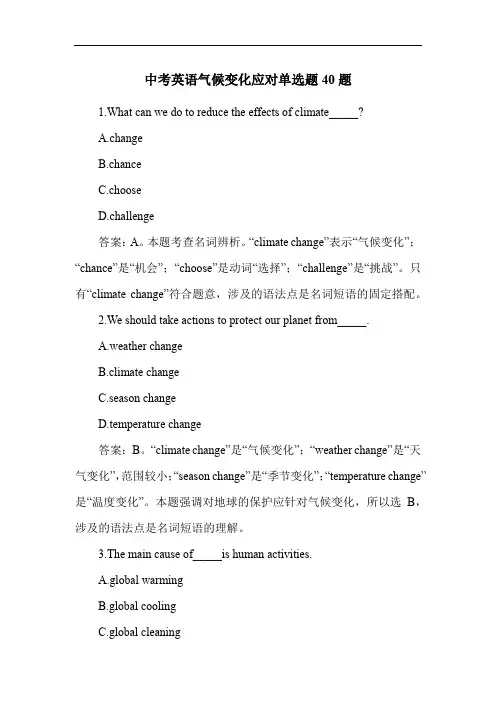
中考英语气候变化应对单选题40题1.What can we do to reduce the effects of climate_____?A.changeB.chanceC.chooseD.challenge答案:A。
本题考查名词辨析。
“climate change”表示“气候变化”;“chance”是“机会”;“choose”是动词“选择”;“challenge”是“挑战”。
只有“climate change”符合题意,涉及的语法点是名词短语的固定搭配。
2.We should take actions to protect our planet from_____.A.weather changeB.climate changeC.season changeD.temperature change答案:B。
“climate change”是“气候变化”;“weather change”是“天气变化”,范围较小;“season change”是“季节变化”;“temperature change”是“温度变化”。
本题强调对地球的保护应针对气候变化,所以选B,涉及的语法点是名词短语的理解。
3.The main cause of_____is human activities.A.global warmingB.global coolingC.global cleaningD.global painting答案:A。
“global warming”是“全球变暖”;“global cooling”是“全球变冷”;“global cleaning”是“全球清洁”;“global painting”是“全球绘画”。
人类活动主要导致全球变暖,所以选A,涉及的语法点是名词的含义理解。
4._____can lead to rising sea levels.A.Climate changeB.Weather changeC.Season changeD.Temperature change答案:A。
气候变化 climate change减缓和适应气候变化 to mitigate and adapt to climate change全球变暖 global warming脆弱性评估 vulnerability assessment累积碳排放 cumulative carbon emissions世界的主要碳排放国 the world's major carbon-emitting nations排放大国 major emitters人均碳排放最多的国家 the biggest carbon emitter per person减排要求 emissions-cutting requirements气候变化的不确定性 the uncertainty surrounding climate change高碳行业 carbon-intensive industries高碳能演 carbon-intensive energy sources 碳汇carbon sink 定义1: 一个碳贮库,它接收来自其他碳贮库的碳,因此贮量随时间增定义2:有机碳吸收超出释放的系统或区域。
如大气、海洋等碳库Carbon reservoir在碳循环过程中,地球系统各个所存储碳的部分Carbon footprint 碳足迹“碳足迹”来源于一个英语单词“Carbon Footprint”,是指一个人的能源意识和行为对自然界产生的影响,简单的讲就是指个人或企业“碳耗用量”。
同时他还是由企业机构、活动、产品或个人引起的温室气体排放的集合。
CCS 碳捕获和储存[包括捕集运输和封存] carbon capture碳捕获低碳技术 low-carbon technology无碳能源 carbon-free energy汽车碳排放 automotive carbon emissions零排放电力来源 zero-emission power sources森林碳汇 forest carbon sink推卸其应该履行的对发展中国家的义务 to shirk responsibilities that should beassumed towards developing countries永久冻土层正在融化 the permafrost is melting冰川 glacier冰河世纪 the Ice Age冰盖 ice sheet冰帽 ice cap冰核 ice core六氟化硫 sulphur hexafluride绝对减排量 absolute cuts in emissions极地冰帽融化提高海平面 melting polar ice caps raise ocean levels碳减排项目 carbon-abatement projects哥本哈根气候变化峰会 the Copenhagen Summit on Climate Change非碳能源 non-carbon energy sources鉴于气候的复杂性 given the climate's complexity可测量、可报告、可核实 measurable, reportable and verifiable三可 MRV有约束力的量化指标 binding quantitative targets额外性 additionality海冰融化 melting sea ice北极冻原 the Arctic tundra温室气体排放的最大来源是发电 the biggest source of greenhouse-gas emissions iselectricity generation减少发电的排放 to cut emissions from electricity production气候灾难 a climate disaster吸热气体 heat-trapping gases甲烷 methane毁林占全球排放的20% deforestation accounts for 20% of global emissions单位GDP的排放量 emissions per unit of GDP确定碳强度的指标 to set a carbon intensity target碳强度 carbon intensity碳强度是指单位GDP的二氧化碳排放量清洁发展机制 the Clean Development Mechanism (CDM)历史排放 historic emissions当前排放 current emissions全球碳排放 global carbon emissions巴厘路线图 the Bali Roadmap作为2007年联合国气候大会最重要的决议,“巴厘路线图”(Bali Roadmap)确定了世界各国今后加强落实《联合国气候变化框架公约《京都议定书》的后续协议 a successor to the Kyoto Protocol缔约方COP[conference of parties]1993年《联合国气候变化框架公约》 the 1993 UN Framework Convention onClimate Change (UNFCCC)联合国政府间气候变化专门委员会 the UN's Intergovernmental Panel on ClimateChange (IPCC)泥炭地 peat lands化石燃料的燃烧释放温室气体 the burning of fossil fuels releases greenhouse gases国际气候变化谈判 international climate change negotiations将二氧化碳深埋地下 to bury carbon dioxide deep underground实现经济的去碳化 to decarbonise the economy一氧化二碳 nitrous oxide一个原则common but differentiated responsibilities共同但有区别的原则一个机构IPCC[Iintergovernmental panel on climate change] 政府间气候变化小组两个协议Kyotol Protocol京都议定书UNCFCC[united Nations Frameworkon climate change]联合国气候变化框架条约两大方法mitigation and adaptation三大机制carbon pricing碳标价emission trading CDM[clean development mechanism]清洁发展机制。
关于气候变化的英语作文Climate change is a pressing global issue that has far-reaching implications for the environment, human societies, and the economy. The following essay explores the causes, effects, and potential solutions to this critical problem.IntroductionClimate change refers to long-term shifts in temperature and typical weather patterns. It is primarily driven by the increase in greenhouse gases in the Earth's atmosphere, which trap heat and lead to a rise in global temperatures.Causes of Climate ChangeThe primary cause of climate change is human activity. Burning fossil fuels such as coal, oil, and gas for energy and transportation releases carbon dioxide into the atmosphere. Deforestation also contributes significantly as trees, which absorb CO2, are cut down, reducing the planet's capacity to regulate carbon levels.Effects of Climate ChangeThe effects of climate change are wide-ranging and include rising sea levels, more frequent and severe weather events such as hurricanes and droughts, shifts in wildlife populations and habitats, and threats to food and water security. These changes can lead to the loss of biodiversity, economic instability, and displacement of communities.Adaptation and MitigationAdapting to climate change involves developing strategies to manage the impacts that are already occurring. This can include building sea walls to protect against rising oceans, developing drought-resistant crops, and creating early warning systems for extreme weather events.Mitigation, on the other hand, focuses on reducing the causes of climate change. This involves transitioning to renewable energy sources, improving energy efficiency, and implementing policies that encourage sustainable practices.International EffortsInternational cooperation is crucial in combating climate change. Agreements such as the Paris Agreement aim to limit global warming by reducing emissions and promoting sustainable development. Countries are encouraged to set ambitious targets for reducing their carbon footprints and to support each other in achieving these goals.ConclusionAddressing climate change requires a collective effort from governments, businesses, and individuals. By understanding the science behind climate change, we can make informed decisions and take action to protect our planet for future generations. It is a challenge that transcends borders and requires a unified global response.Call to ActionAs individuals, we can make a difference by reducing our own carbon footprints, supporting policies that combat climatechange, and educating others about the importance of environmental stewardship. Every action counts, and together, we can help to mitigate the effects of climate change and build a more sustainable future.。
气候变化的英语翻译1、关于气候变化知识的英语翻译(最好是初,高中水平就能看懂的)Climate change is a long-term change in the statistical distribution of weather patterns over periods ranging from decades to millions of years. It may be a change in average weather conditions or the distribution of events around that average (e.g., more or fewer extreme weather events). Climate change may be limited to a specific region or may occur across the whole Earth.气候百变度化是从几十年到上百万年期间,气候模式的统计数据分布长期变化。
气候变化可能发生问于一般的气候条件下,也可能发生于该气候条件下的事件分布,(比如较多答或较少的专极端气候事件)。
气候变化也可能局限于特定的地区属,也可能发生在全球范围内。
2、一篇关于翻译全球气候变暖的英语短文、急全球变暖(The Global Warming)People around the world may feel that the climate has been getting steadily warmer and warmer in recent years. Places which used to be abundant in snowfall have frequently experienced snowfree(无雪的) winters. Drought lasts longer in some dry areas. People find that without air conditioners they could hardly work or fall asleep on hotter summer daysg. The side effects of global warming are alarminS. A warmer global climate melts the ice caps, raising sea levels. What is more, it disturbs weather patterns, causing droughts, severe storms, hurricanes (飓风). People suffer a lot from disasters relevant to global warming.To stop global warming we should make immediate and continual efforts. We hope the situation will soon change. Global warming catches and holds our concern, for it affects us and will affect our later generations. We cannot wait any longer. Do it. Do it right. Do it right now.3、“应对气候变化”用英语怎么说?cope with weather changes4、气候变化大会用英文怎么说Climate Change Summit在泰晤士报网站上看到的5、关注气候变化用英语怎么说关注气候变化Pay attention to climate change关注气候变化Pay attention to climate change6、全球气候变暖怎么翻译成英文?global warming全球变暖7、全球气候变化的英文怎么说?8、全球气候变暖用英文怎么说?global warming 或者green house effect 温室效应,又译全球气候变暖The greenhouse effect is the rise in temperature that the Earth experiences because certain gases in the atmosphere (water vapor, carbon dioxide, nitrous oxide, and methane, forexample) trap energy from the sun. Without these gases, heat would escape back into space and Earth’s average temperature would be about 60ºF colder. Because of how they warm our world, these gases are referred to as greenhouse gases.Have you ever seen a greenhouse? Most greenhouseslook like a small glass house. Greenhouses are used to grow plants, especially in the winter. Greenhouses work bytrapping heat from the sun. The glass panels of the greenhouse let in light but keep heat from escaping. This causes the greenhouse to heat up, much like the inside of acar parked in sunlight, and keeps the plants warm enough tolive in the winter.The Earth’s atmosphere is all around us. It is the air that we breathe. Greenhouse gases in the atmosphere behave much like the glass panes in a greenhouse. Sunlight entersthe Earth's atmosphere, passing through the blanket of greenhouse gases. As it reaches the Earth's surface, land, water, and biosphere absorb the sunlight’s energy. Once absorbed, this energy is sent back into the atmosphere. Someof the energy passes back into space, but much of it remains trapped in the atmosphere by the greenhouse gases, causingour world to heat up.The greenhouse effect is important. Without the greenhouse effect, the Earth would not be warm enough for humans to live. But if the greenhouse effect becomes stronger, it could make the Earth warmer than usual. Even a littleextra warming may cause problems for humans, plants, and animals.9、“气候变化”用英语怎么说:气候变化(climate change);。
climate change 英语作文Climate Change: A Global CrisisIntroductionClimate change has become one of the most pressing issues facing the world today. The Earth's climate is changing at an unprecedented rate due to human activities, leading to a wide range of environmental, social, and economic impacts. In this essay, we will explore the causes and effects of climate change, as well as discuss potential solutions to mitigate its negative consequences.Causes of Climate ChangeThe primary cause of climate change is the excessive emissions of greenhouse gases, such as carbon dioxide, methane, and nitrous oxide, into the atmosphere. These gases trap heat from the sun, leading to the warming of the Earth's surface and oceans. The main sources of greenhouse gas emissions include burning fossil fuels for energy, deforestation, and industrial processes. In addition, agricultural activities, such as livestock farming and rice cultivation, also contribute to greenhouse gas emissions.Effects of Climate ChangeThe impacts of climate change are wide-ranging and severe. One of the most significant consequences of global warming is the rise in global temperatures, leading to more frequent and intense heatwaves, droughts, and wildfires. Another major impact is the melting of glaciers and ice caps, leading to rising sea levels and coastal flooding. Additionally, climate change is causing shifts in precipitation patterns, leading to more frequent and severe storms, hurricanes, and floods. These extreme weather events have devastating effects on human communities, ecosystems, and economies worldwide.In addition to physical impacts, climate change also has social and economic consequences. In developing countries, vulnerable populations are disproportionately affected by climate change, as they lack the resources to adapt to its impacts. Small island nations, for example, are facing the threat ofsea-level rise, while farmers in Africa are experiencing reduced crop yields due to changing weather patterns. The economic costs of climate change are also substantial, with estimates suggesting that the global economy could lose trillions of dollars due to extreme weather events, crop failures, and infrastructure damage.Solutions to Climate ChangeIn order to address the challenges of climate change, we need to take urgent and collective action to reduce greenhouse gas emissions and adapt to its impacts. One of the key solutions is to transition to renewable energy sources, such as solar, wind, and hydropower, which are cleaner and more sustainable alternatives to fossil fuels. By investing in renewable energy infrastructure and technologies, we can significantly reduce our carbon footprint and mitigate the effects of climate change.In addition to reducing emissions, we also need to adapt to the changing climate by implementing measures to protect vulnerable communities and ecosystems. This includes building resilient infrastructure, improving water management systems, and developing early warning systems for extreme weather events. By investing in adaptation strategies, we can enhance the resilience of communities and reduce the risks posed by climate change.Furthermore, international cooperation is essential to addressing the global challenge of climate change. Countries need to work together to set ambitious emission reduction targets, share best practices, and mobilize financial resources to support developing countries in their transition to a low-carbon economy. The Paris Agreement, adopted in 2015, is a landmarkinternational treaty that aims to keep global temperatures well below 2 degrees Celsius above pre-industrial levels, and to pursue efforts to limit the temperature increase to 1.5 degrees Celsius. By working together towards a common goal, we can make significant progress in combating climate change and building a more sustainable future for all.ConclusionIn conclusion, climate change is a global crisis that requires urgent action from all sectors of society. By addressing the root causes of climate change, reducing greenhouse gas emissions, and adapting to its impacts, we can create a more sustainable and resilient future for generations to come. It is imperative that we act now to protect our planet and ensure a healthy and prosperous future for all. Let us work together to combat climate change and build a better world for ourselves and future generations.。
Climate Change
The world population is continuing to rise, as of March 26, 2014, it is estimated to number 7.162 billion by the United States Census Bureau (USCB). We are producing pollution to the earth, and the climate is finally changed. Human man activities can effect on our climate. When we are talking about climate change, we are talking about changes in long-term averages of daily weather. Climate change is a significant and lasting change in the statistical distribution of weather patterns over periods ranging from decades to millions of years. It may be a change in average weather conditions, or in the distribution of weather around the average conditions (i.e., more or fewer extreme weather events). Climate change is caused by factors such as biotic processes, variations in solar radiation received by Earth, plate tectonics, and volcanic eruptions. Certain human activities have also been identified as significant causes of recent climate change, often referred to as "global warming".
Global warming refers to an unequivocal and continuing rise in the average temperature of Earth's climate system. Human influence has been detected in warming of the atmosphere and the ocean, in changes in the global water cycle, in reductions in snow and ice, in global mean sea level rise, and in changes in some climate extremes. This evidence for human influence has grown since AR4. It is extremely likely (95-100%) that human influence has been the dominant cause of the observed warming since the mid-20th century.
Long-term effects of global warming: On the timescale of centuries to millennia, the magnitude of global warming will be determined primarily by anthropogenic CO2 emissions. This is due to carbon dioxide's very long lifetime in the atmosphere. Stabilizing global average temperature would require reductions in anthropogenic CO2 emissions. Reductions in emissions
of non-CO2 anthropogenic GHGs (e.g., methane and nitrous oxide) would also be necessary. For CO2, anthropogenic emissions would need to be reduced by more than 80% relative to their peak level. Even if this were to be achieved, global average temperatures would remain close to their highest level for many centuries.
Climate change could result in global, large-scale changes in natural and social systems. Two examples are ocean acidification caused by increased atmospheric concentrations of carbon dioxide, and the long-term melting of ice sheets, which contributes to sea level rise. Some large-scale changes could occur abruptly, i.e., over a short time period, and might also be irreversible. An example of abrupt climate change is the rapid release of methane and carbon dioxide from permafrost, which would lead to amplified global warming. Scientific understanding of abrupt climate change is generally poor. However, the probability of abrupt changes appears to be very low. Factors that may increase the probability of abrupt climate change include higher magnitudes of global warming, warming that occurs more rapidly, and warming that is sustained over longer time periods.
With the population of the world growing, human is producing more pollution to the earth and the air such as water pollution, air pollution, plastic pollution, industrial pollution, and so on… these entire combine together to cause the climate change. And the climate change effects on our life every day. The temperature of the globe is getting higher and higher, people need more air conditioner to cold themselves, and then the air conditioner consume a large amount of electricity, which is usually powered by burning coal that releases greenhouse gases, causes acid rain, and that isn't good for the env ironment…and other pollutions have the same chain and cycle reaction to the climate that we are repeating every day.
Work cited /wiki/World_population /wiki/Climate_change
/facts/weather_climate.html。